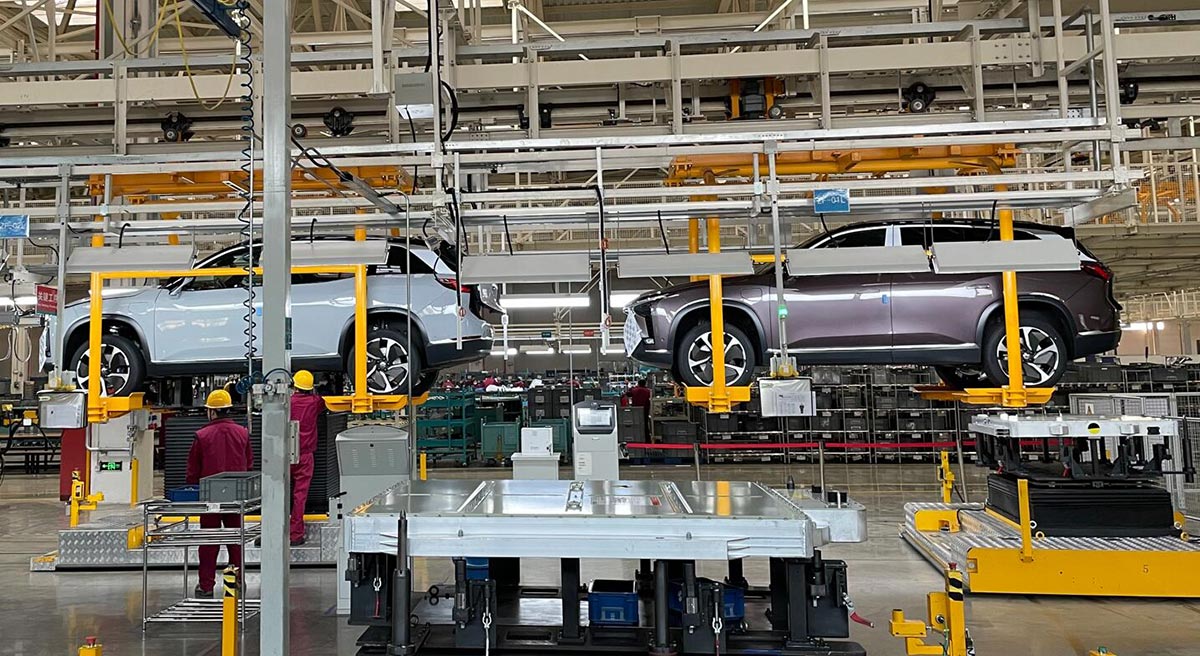WeLion aims to grow revenue 20-fold to RMB 10 billion by 2025, company founder Li Hong said in a recent Bloomberg interview.

(File photo shows the workshop of Nio's first factory in Hefei. Image credit: CnEVPost)
Beijing WeLion New Energy Technology, which supplies high energy density semi-solid-state battery cells to Nio (NYSE: NIO), plans to go public as early as 2025, Bloomberg said in a report today.
WeLion aims to grow revenue 20-fold to RMB 10 billion ($1.4 billion) by 2025, the company's founder Li Hong said in a recent interview, according to Bloomberg.
The company's most recent funding round valued it at 15.7 billion yuan, Li said.
WeLion's solid-state battery technology has attracted interest from a number of automakers, including Volkswagen, Ford, Mercedes-Benz, Geely Automobile Holdings and Xiaomi, the report quoted Li as saying.
WeLion is building four more battery production facilities in China to increase its annual capacity to 30 GWh by 2025 from the current 6 GWh, the report said, adding that in addition to electric vehicles (EVs), the batteries could also be used in energy storage systems and drones.
Li acknowledged that the company may not be able to erode the market share of lithium-ion battery giants like CATL, and that WeLion's market share could be less than 1 percent by 2025, according to the report.
Nio unveiled a 150-kWh semi-solid-state battery when it launched its flagship sedan, the Nio ET7, on January 9, 2021 at the Nio Day 2020 event. The EV maker did not mention the supplier of the battery at the time.
On March 27, 2022, Li confirmed WeLion as Nio's semisolid-state battery supplier at a forum, saying the two plan to launch a hybrid solid-liquid electrolyte battery with a 1,000-kilometer range on a single charge, based on the ET7 model.
WeLion began delivering 360 Wh/kg lithium-ion battery cells to Nio on June 30, and held a delivery ceremony in Huzhou, Zhejiang province, where one of its manufacturing base is located.
Headquartered in Beijing, WeLion has four production bases in Fangshan, Beijing; Liyang, Jiangsu province; Huzhou, Zhejiang province; and Zibo, Shandong province, of which the Huzhou base is WeLion's production base for automotive power batteries, its press release at the time said.
On May 24, at the launch of the new ES6, Nio founder, chairman, and CEO William Li announced that the company's 150-kWh semi-solid-state battery packs would be put into service in July.
However, at the third annual Nio Power Day event on July 20, Nio co-founder and president Qin Lihong said that there is a slight change in the availability of Nio's 150-kWh battery pack, hinting that the delivery of the pack will be delayed again. The date of availability for the pack is currently unknown.
WeLion's most recent funding came in November of last year when its financial advisor Lighthouse Capital said in a press release that WeLion had closed an RMB 1.5 billion Series D round.
Originally a little-known power battery startup, WeLion began to gain more attention after Nio's 150-kWh battery pack was announced in early 2021.
Several well-known VCs approached WeLion around 2018, however, most did not decide to invest in it. In the following two years, WeLion didn't announce any new funding for a long period of time, a PE Daily report in March 2022 noted.
The turning point for WeLion came in 2021, when a number of venture capital and private equity firms began to ramp up their engagement with WeLion after Nio's launch put the battery industry in the spotlight, according to the report.
($1 = RMB 7.1931)
Nio starts to get cells from WeLion, as deliveries of 150-kWh batteries set to begin in Jul



